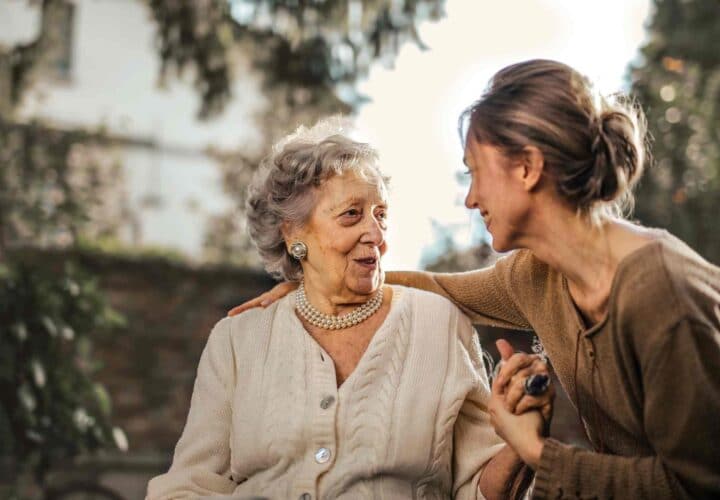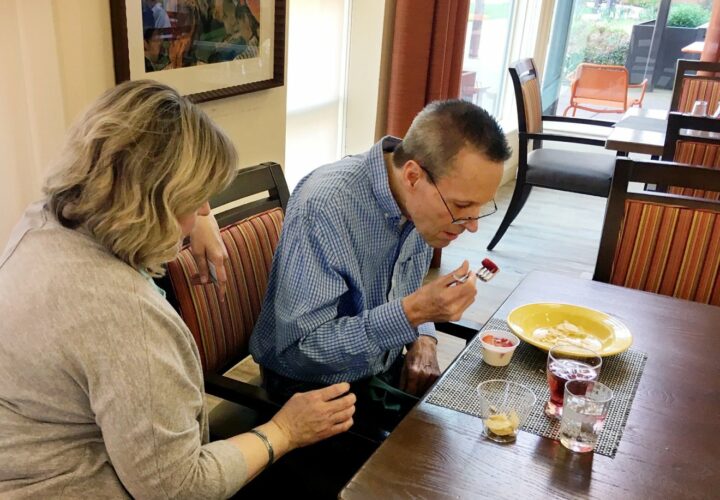Guilt is a complicated emotion — all the more so for family caregivers. Experts weigh in on how to untangle and overcome it in all its forms.
Megan, a 36-year-old special education teacher in Pennsylvania, felt honored to care for two of her grandparents who were living with Alzheimer’s. But over time, caregiving began to take a toll on her. While she knew there was nothing she could do to stop the progression of the disease, she found herself constantly wondering whether she was doing enough to provide care for her grandparents.
“You question all of the decisions about what’s best for them versus what’s easier. I’d feel guilty or bad about getting frustrated with them when I knew full well they couldn’t help it,” Megan said.
She recalled a specific incident that left her crippled with guilt — one that she still remembers years later.
“One time I took my Pop to Walmart for new shoes. I tried to warn him about the curb when we were leaving. He was kind of hard of hearing, and missed the step and kind of fell … then looked at me like, ‘Why didn’t you tell me about that?’”
Like Megan, many caregivers struggle, constantly wondering whether they’re doing enough. While dangerous or injury-causing incidents (like Megan’s experience) can create long-lasting feelings of guilt, other types of caregiver guilt lurk further beneath the surface.
Types of Caregiver Guilt
Caregiving is necessary, selfless — and difficult. It can be hard for caregivers to admit that they’re having a tough time managing guilt and stress. Yet, these feelings of guilt are so widely shared that they have been the subject of research for years, and in fact, researchers have made strides in identifying and categorizing this guilt toward helping caregivers cope. A 2010 study identified five categories of caregiver guilt.
1. Guilt about doing wrong by the care recipient
Like Megan’s experience, caregivers may replay certain incidents in their minds, wondering how they could have shown more patience or love, or how they could have made a decision that may have avoided an accident or injury.
2. Guilt about not rising to the occasion as a caregiver
Some caregivers balance multiple roles: spouses, parents, employees, and more. Work, family, and other day-to-day issues may pale in comparison to life-or-death issues associated with caregiving. This can leave caregivers wondering whether they’re making their loved one in need of care enough of a priority.
3. Guilt about self-care
When caregiving is at the forefront of one’s life, self-care can take a back seat. Neglect of one’s health, struggles with stress management, and letting social activities go to the wayside can all play into feelings of guilt.
4. Guilt about neglecting other relatives
Those who have a knack for providing compassionate care may find that they fall into the caregiver role often. Caregivers may also find that they’re the go-to person for family members in crisis. In addition to being unable to provide crisis support to other family members when stretched thin by caregiving, caregivers may also find that they’re missing out on time with their spouse, children, and others important to them.
5. Guilt about having negative feelings towards other people
It’s typical to have negative feelings toward others from time to time. Feeling upset with or even angry at other family members is common, researchers pointed out. Caregivers who strive to keep a positive mindset may struggle with guilt over feelings of anger or frustration with others who could have taken responsibility for their loved one, but didn’t rise to the occasion.
Staying Strong: How Caregivers Can Care for Themselves While Caring for Others
Do you recognize any of the above? Many caregivers push guilt management strategies aside, feeling they should be able to “deal with” feelings of guilt. Caregiving often brings feelings of grief, stress, and sadness in addition to guilt, and it’s vital that caregivers prioritize their mental health, both for their well-being and to provide the best care to their loved ones.
But, experts say there are self-care strategies to ease feelings of guilt. Dr. Vicki Rackner, a patient-physician relationship advocate and former surgeon, said that family members who are ill don’t’ expect their caregivers to be selfless, and that it’s important for caregivers to remember that they need to prioritize their own care in order to be their best for their loved one.
“Loved ones neither want nor expect selfless servants,” Rackner wrote for Caregiver.com. “As a caregiver, when you care for yourself, you increase and improve your own caring.”
According to experts, helpful strategies that may help caregivers prioritize self-care include:
1. Name and recognize the emotion of guilt
Guilt is a complex emotion, and it can be hard to name. According to Dr. Jonathan Graff-Radford, pushing guilt to the back burner can create many issues that affect both the caregiver’s quality of life and their ability to care for others.
“Ignoring the guilt can lead to problems with ating, sleeping and concentration and result in unhealthy methods of coping with the stress of caregiving — such as substance abuse,” he said in an article for Mayo Clinic.
For many caregivers, he wrote, guilt is a combination of emotions, including anxiety, embarrassment, shame, frustration, and resentment. Journaling or talking to a trusted friend or therapist about emotions surrounding caregiving can be a positive step toward guilt management.
2. Carve out self-care time
Many caregivers don’t just push self-care to the back burner — they take it off the stove altogether. Dr. Marlynn Wei, editor at Harvard Health Publishing, encourages caregivers to prioritize self-care:
“Your body does have a natural way to combat stress,” Wei wrote for Harvard Health. “The counter-stress system is called the ‘relaxation response,’ regulated by the parasympathetic nervous system. You can purposefully activate the relaxation response through mind-body practices like yoga, tai chi, meditation, and deep relaxation techniques.”
It’s clear: caregivers must make time for relaxation and self-care in order to thrive in their helping role.
3. Work toward understanding and forgiveness
As humans, we do the best we can with what we have. Guilt over breaking former promises to loved ones or speaking in harsh tones during a difficult moment can be tough to overcome, but self-forgiveness is key in moving forward. Caregivers may also need to forgive the person they care for due to past wrongs.
Fargo-based Hospice of the Red River Valley Chaplain Lauryl Ivers, wrote that this can be difficult — but worth it. “The significance of forgiveness at the end of life is it can bring healing to the person who is doing the forgiving and to the person who is being forgiven,” she wrote in a post for Hospice of the Red River Valley. “It can also impact the family and the greater community of relationships.”
4. Get support
Many caregivers feel that no one can understand what they’re going through — and a support group can help. Dr. Wyatt Fisher, a clinical psychologist and author, wrote for Caring.com, “You can learn from other caregivers on how they manage some of the same types of issues you face.”
The day-to-day tasks of caregiving can feel more manageable when caregivers realize they aren’t alone. Hospitals, hospice organizations, and senior care homes offer caregiver support groups. Caregivers can go to groups to share or listen, taking comfort in the fact that they aren’t alone. Support groups can also provide a much-needed social outlet for those who spend their days taking care of someone else.
You may also want to consider developing a dementia care team that can help take some of your most time-consuming care tasks off of your plate, hiring skilled caregivers to help you with day-to-day tasks, or working with a volunteer organization that can provide you and your loved one with some extra help.



